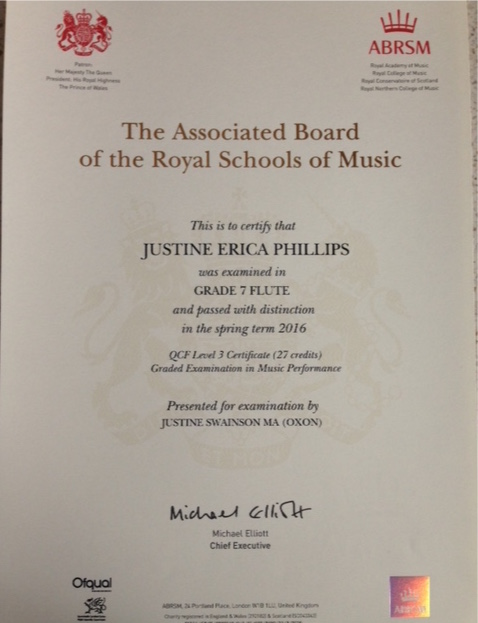The results are in!
I’d like to say I’m delighted to report that I got a Distinction.
In truth, if I hadn’t I think I’d have quit the day job… And frankly, I’m a *little* disappointed with my marks….
Here goes:
List A – Telemann – comments included ‘acute awareness of style’; ‘eloquent rendition’; ‘lines vividly shaped’; ‘articulation intelligently conceived and rhythm perfect’… I wonder what he docked a mark for then?
List B – Godard- I think I suggested in my original post that he was enjoying this, and hey presto the magic 30/30 appears.
List C – Köhler study – lowest mark of the three at 28. Despite being ‘musically astute’ and creating ‘unexpected expressive breadth’ the fact that ‘occasionally tone thinned a little’ (in a piece composed almost entirely of semiquavers…) was enough for me to sacrifice 2 marks.
Scales – again 2 marks lost. Frankly I’m appalled. I boldly stated in my original blog (here) that ‘nothing short of full marks would do’ and reported that I was confident all were correct on the day. Indeed, the examiner conceded that ‘these were very well known and played with an even flow’. Apparently for playing them at a ‘slightly cautious’ tempo (really?) two marks were docked. Definitely something to pass on to my future candidates.
Sight-reading – this is a shocker. Without wishing to blow my own trumpet (or flute) I am a brilliant sight-reader. I would honestly not expect many candidates to rock up to Grade 7 and produce a better sight-reading test than me. Imagine my horror then, when my ‘musically aware reading’ (yes, I read all the articulation, dynamics, tempo changes) ‘played with an authoritative air’… resulted in a loss of two marks for ‘an odd small rhythmic error or tonal blemish’. To me, sounds like he was hedging his bets there, and I actually wish I had a recording of it, because I’d like to take issue with that!
Aural – well I knew this hadn’t gone swimmingly, and the mark showed it – 15/18. I think this was one of my greatest areas of learning, because even though I believe myself to have a very good musical ear, I found the pressure of the ‘test’ situation did little to put me at my ease or illicit full and committed responses. Looking back at my original post, I can see that I noted the rather regimented delivery of the rubrics, and this coupled with lack of interaction from the examiner meant that it was difficult to gauge whether I had given the information he required. This was reflected in comments such as ‘period was identified but not fully justified in test D’. Would it really have compromised the test to ask me ‘Is there anything else you’d like to add?’ I also believe that if the ABRSM truly wish to mark positively,as they say they do in their conferences and teacher training sessions, that when candidate recognises that they have made an error and offers to correct it (as I did in the clapping), then credit should be given rather than the opportunity denied. If I feel like that, I’m sure a younger / less experienced candidate would feel similarly.
My overall mark was 140. Best mark I’ve had in an exam, but nonetheless lower than my aim.
So, what have I learned?
Firstly, my wish to reconnect with the candidate’s position and feelings was wholeheartedly achieved. The pressure of the build up to the exam, the on-the-day nerves, the ‘rabbit-in-the-headlights’ feeling of having scale requirements and aural tests fired at you, the anticipation of the result – I felt them all!
Secondly, this has flagged up to me the stringency of the supporting tests. In particular, I’m sure many of my teacher friends will agree that teaching aural skills is demanding at the best of times, relying on the teacher’s own ear and probably being easier to teach if you either play piano to Grade 8 or beyond or sing / sight-sing regularly in four-part harmony. I have long preferred the aural tests of Trinity exam board for all grades, since they involve less singing of any kind, in favour of developing what I would consider to be more rounded listening and musical appreciation skills.
And finally, I think this experience has made me question what exam boards (or maybe just ABRSM?) are looking for from candidates. Overall I don’t see the comments or figures on my mark sheet as congruent with the ABRSM message of positive marking rather than looking for faults. And more importantly, where marks have been lost, the comments (notably in the pieces) give very little guidance on how I could have done better. The word ‘blemish’ appears in four separate comments; I remain unsure what a candidate is meant to understand from this and how they could take such a comment forward in order to improve their performance in the next exam. Not wishing to sound like sour grapes, but if a candidate with the experience and training that I have is being assessed as presenting for the exam at 93%, I wonder what chance I have of preparing my littlies to do better!
This has definitely been my bravest challenge to date. Sharing the exam experience was hard; sharing the results and comments harder. Thank you to my kids, who listened to me practice, to Heather, who tested me on scales and practised aural with me, and to Helen my accompanist.
And here’s my shiny certificate!

Congratulations hon that’s fantastic!! I can still remember the terror of doing grade 3 aged 11yrs and needless to say I didn’t take any more!! Only the odd tweet on my flute these days 35yrs later and as you know I’ve never plucked up the courage to inflict you with a rendition!!!
LikeLike